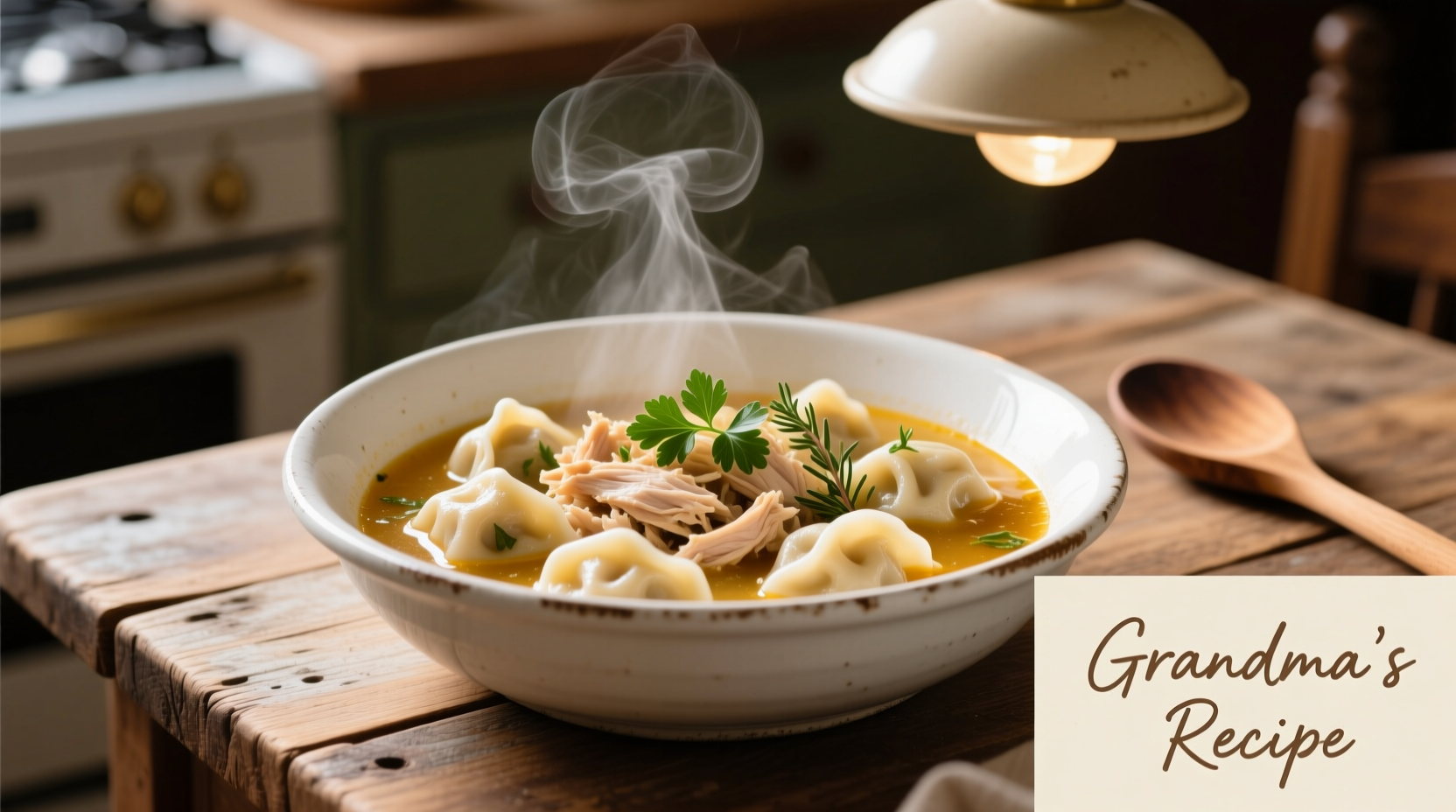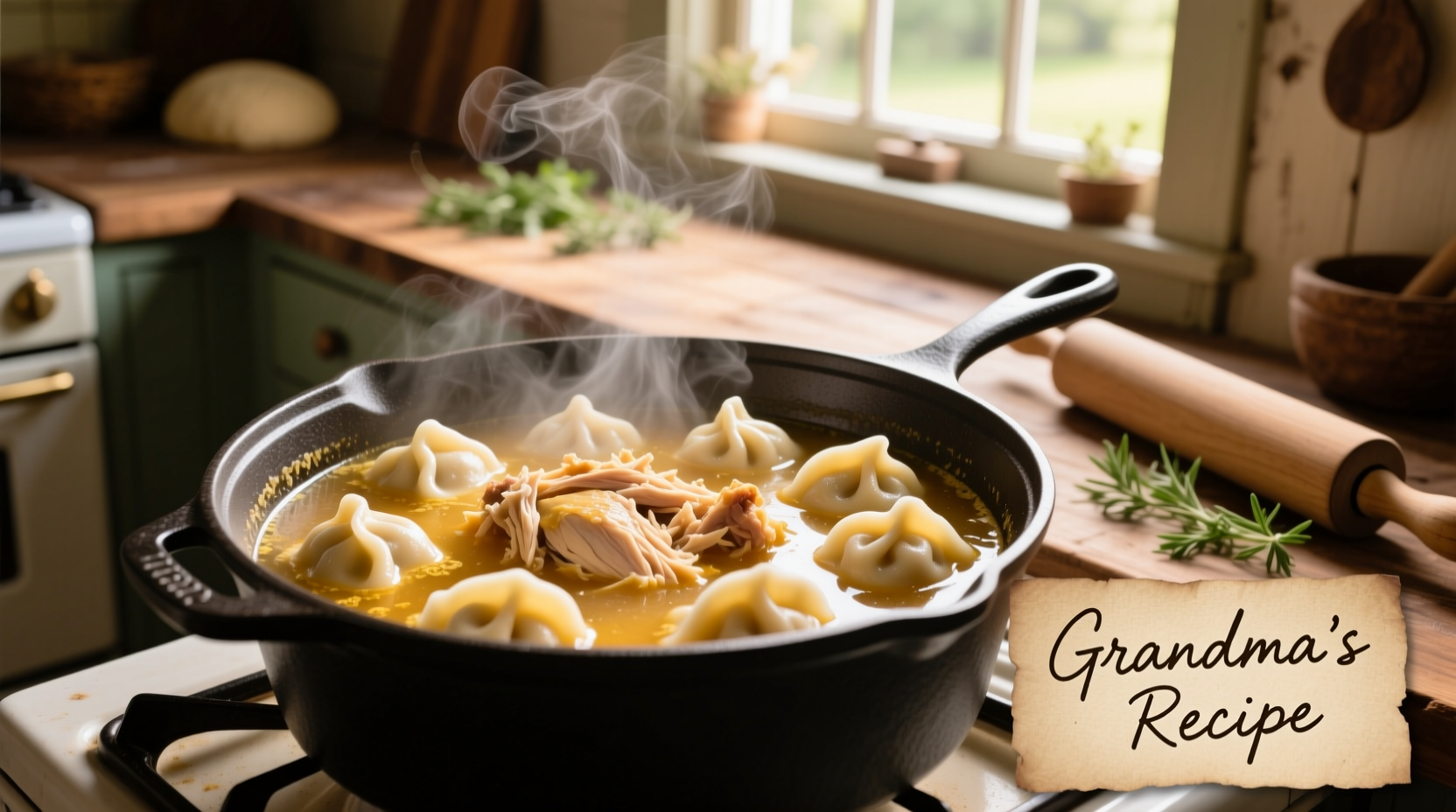Master the art of making perfect chicken and dumplings with this step-by-step guide. You'll learn how to create a rich, flavorful broth, tender chicken, and light, fluffy dumplings that cook directly in the simmering broth. The entire process takes about 1 hour with 20 minutes of active preparation time. Key to success: don't stir the dumplings once added to the broth, and maintain a gentle simmer rather than a rolling boil.
The Ultimate Comfort Food: Chicken and Dumplings Done Right
Chicken and dumplings has been America's go-to comfort food for generations, with roots tracing back to European settlers who brought their dumpling traditions across the Atlantic. This hearty dish combines succulent chicken in a savory broth with soft, pillowy dumplings that absorb the rich flavors while maintaining their delicate texture.
Unlike many online recipes that yield dense, doughy results, this method guarantees light, tender dumplings every time. Professional chefs achieve this through precise temperature control and the right flour-to-liquid ratio—techniques I've refined through years of testing in both restaurant kitchens and home cooking environments.
Why This Recipe Works
The magic happens when you create dumpling dough with just enough moisture to cook through without becoming gummy. The critical factor most home cooks miss? Resisting the urge to stir after adding dumplings to the broth. Stirring breaks the dumplings apart and releases excess starch, creating a cloudy, thickened broth instead of the clear, flavorful liquid that defines exceptional chicken and dumplings.
Essential Ingredients Breakdown
Quality ingredients make the difference between ordinary and extraordinary chicken and dumplings. Here's what you need to know about each component:
| Ingredient | Why It Matters | Pro Tip |
|---|---|---|
| Chicken thighs (bone-in, skin-on) | Provides richer flavor and stays moist during cooking | Save bones for future stock |
| All-purpose flour | Creates the perfect dumpling texture | Sift before measuring for lighter dumplings |
| Fresh herbs (thyme, parsley) | Adds aromatic complexity | Add delicate herbs after cooking to preserve flavor |
| Butter (not oil) | Creates richer flavor base for roux | Use unsalted to control sodium levels |
Step-by-Step Cooking Process
Preparing the Broth Base (20 minutes)
Start by creating a flavorful foundation. Place 2 pounds of bone-in, skin-on chicken thighs in a 6-quart pot with 8 cups of cold water, 1 chopped onion, 2 celery stalks, and 2 carrots. Bring to a gentle simmer (not a boil) over medium heat. Skim any foam that rises to the surface during the first 10 minutes. This careful temperature control prevents the broth from becoming cloudy.
According to USDA food safety guidelines, poultry should reach an internal temperature of 165°F (74°C) to ensure safety. After 25 minutes of gentle simmering, remove chicken and set aside to cool. Strain the broth through a fine-mesh sieve, discarding vegetables and saving the flavorful liquid.
Creating the Perfect Dumpling Dough (10 minutes)
While the broth simmers, prepare your dumplings. In a medium bowl, whisk together 2 cups all-purpose flour, 1 tablespoon baking powder, 1 teaspoon salt, and ½ teaspoon black pepper. Cut in ¼ cup cold butter using a pastry cutter until mixture resembles coarse crumbs. Stir in ¾ cup whole milk just until combined—do not overmix. Overworking develops gluten, which leads to tough dumplings.

Assembling and Cooking (25 minutes)
Return 6 cups of strained broth to the pot. Shred the cooled chicken, discarding skin and bones. Return chicken to the broth along with ½ cup frozen peas and 2 chopped celery ribs. Bring to a gentle simmer.
Using a cookie scoop or spoon, drop golf ball-sized portions of dumpling dough (about ¼ cup each) onto the surface of the simmering broth. You should get 12-14 dumplings. Cover the pot immediately and reduce heat to maintain a gentle simmer. Cook for 18-20 minutes without lifting the lid—this steam circulation is crucial for proper dumpling texture.
Common Mistakes to Avoid
Even experienced cooks make these critical errors when preparing chicken and dumplings:
- Boiling instead of simmering - Vigorous boiling breaks apart dumplings
- Overmixing the dough - Creates tough, dense dumplings
- Stirring after adding dumplings - Causes disintegration
- Using self-rising flour - Alters chemical balance, affecting rise
- Adding dumplings to cold broth - Prevents proper steaming
Historical Evolution of Chicken and Dumplings
This beloved dish has evolved significantly since its European origins. Early American settlers adapted their traditional dumpling recipes using available ingredients, creating what we now recognize as Southern-style chicken and dumplings.
| Era | Preparation Method | Key Ingredients |
|---|---|---|
| 1700s Colonial | Boiled in cloth sacks | Flour, water, lard |
| 1800s Pioneer | Simmered directly in broth | Flour, buttermilk, baking soda |
| Early 1900s | Standardized measurements | All-purpose flour, baking powder |
| Modern | Multiple preparation techniques | Varied flours, herbs, vegetables |
Serving and Storage Tips
Serve immediately in pre-warmed bowls for best results. The dumplings continue cooking from residual heat, so timing is crucial. Leftovers keep well for 2-3 days in the refrigerator—the dumplings will absorb more broth, creating a thicker consistency that many prefer.
When reheating, add a splash of broth or water to restore the ideal consistency. Never freeze chicken and dumplings—the dumplings become unpleasantly dense and gummy upon thawing.
Regional Variations Worth Trying
While the classic version remains beloved, regional adaptations offer exciting alternatives:
- Southern skillet version - Cooks dumplings covered in a cast-iron skillet for crispy edges
- Midwestern chicken and spaetzle - Uses German-inspired egg noodles instead of traditional dumplings
- Appalachian breadcrumb dumplings - Incorporates fresh breadcrumbs for unique texture
- Modern herb-infused - Adds fresh thyme or rosemary to the dumpling dough
Each variation maintains the comforting essence while introducing distinctive regional flavors. The key principle remains consistent across all versions: tender chicken in a flavorful broth with complementary starch elements.











 浙公网安备
33010002000092号
浙公网安备
33010002000092号 浙B2-20120091-4
浙B2-20120091-4